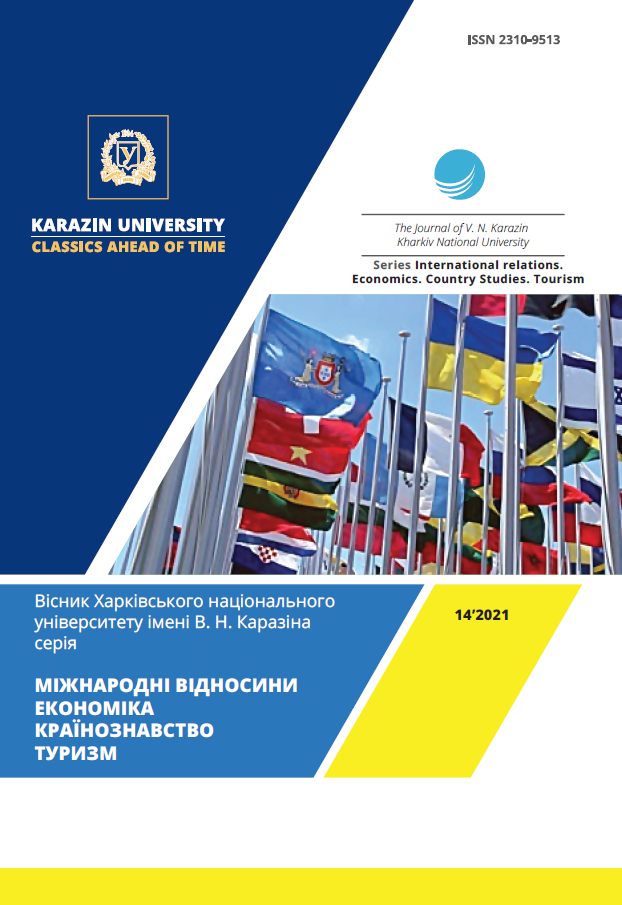Ways to increase the efficiency of SPA-hotels in a pandemic
Abstract
In the context of the COVID-19 pandemic, the demand for spa treatments began to decline significantly and this led to the partial or complete cessation of a number of spa complexes. In this situation, the beauty industry began to rapidly lose its credibility in the international service market. Restoring the position of the SPA industry is possible under the conditions of adequate response and rapid adaptation to modern challenges. The subject of the research in the article is the peculiarities of hotel SPA operation during the COVID-19 pandemic. The goal of the article is to determine measures to increase the efficiency of SPA hotels in pandemic conditions. Objectives: elucidation of the concept of "SPA" in modern scientific discourse, as well as the development of mechanisms for optimizing the operation of hotel SPAs in a period of crisis. General scientific methods used to achieve the goal of research: analysis, synthesis, systematization, comparison, abstract-logical method. The results of the study show that the COVID-19 pandemic has significantly changed people's lives. On the one hand, the majority of the population has become much poorer, which has affected their well-being, and on the other hand, the consequences of the disease have led to impaired physical and mental health. In the current situation, in order to maintain and restore the health of the population, SPA institutions should offer consumers loyal prices, individual approach to each client, expand the range of contactless SPA services, implement innovative rehabilitation programs aimed at restoring the body to the post-COVID period in accordance with all anti-epidemic safety measures. Conclusion: therefore, the competent construction of a strategy to maintain health and well-being will allow owners to increase the efficiency of hotels through interesting proposals that will improve profitability, length of stay, cross-selling and retention rates.
Downloads
References
/References
Бугас Н. В., Гутман А. І. Вплив ризиків та невизначеностей на ефективність діяльності санаторно-курортних закладів України в умовах пандемії COVID-19. URL: https://cutt.ly/oRVCe98
Погребняк Л. Вплив пандемії Сovid-19 на стан туристичного та рекреаційного бізнесу в Україні. Л: ЛНАУ, 2020.
Постанова «Про затвердження Тимчасових рекомендацій щодо організації протиепідемічних заходів в перукарнях та салонах краси на період карантину у зв'язку з поширенням коронавірусної хвороби (COVID-19)» від 09.05.2020. URL: https://zakon.rada.gov.ua/rada/show/v0020488-20
Dunn, H. High-level wellness: A collection of twenty-nine short talks on different aspects of the theme «High-level wellness for man and society». Beatty. 1961.
Ellis, S. Is wellness part of spa, or is spa part of wellness? Spafinder. [online] https://www.spafinder.com/blog/health-and-well-being/wellness-part-spa-spa-part-wellness/
International Spa Association. URL: https://experienceispa.com/
New report focuses on salon & spa business growth URL: https://www.massagemag.com/new-report-focuses-on-salon-spa-business-growth-132128/
Rutynskyi, M.; Kushniruk, H. Restaurant Industry in the Tourist City of Eastern Europe: Post-COVID-19 Perspectives – The Case of Lviv, Ukraine. 2022, 220-243, DOI: 10.4018/978-1-7998-9148-2.ch012
Stará, J., & Charvát, M. Wellness: Its origins, theories and current applications in the United States. Acta Salus Vitae. URL: https://www.muni.cz/en/research/publications/1174118
The Global Wellness Economy: Looking Beyond COVID – December 2021.
Uberoi, S. Spa and wellness: What’s the difference? Medium. March 2, 2014. URL: https://medium.com/spa-business/spa-and-wellness-whats-the-difference-62e84ae29df1U
Buhas N. V., Hutman A. I. Vplyv ryzykiv ta nevyznachenostei na efektyvnist diialnosti sanatorno-kurortnykh zakladiv Ukrainy v umovakh pandemii COVID-19 [The impact of risks and uncertainties on the effectiveness of the activity of sanatorium-resort institutions of Ukraine in the conditions of the COVID-19 pandemic]. Available at: https://cutt.ly/oRVCe98
Pohrebniak L. (2020) Vplyv pandemii Covid-19 na stan turystychnoho ta rekreatsiinoho biznesu v Ukraini [Impact of the Covid-19 pandemic on the state of tourism and recreation business in Ukraine]. L: LNAU.
Postanova «Pro zatverdzhennia Tymchasovykh rekomendatsii shchodo orhanizatsii protyepidemichnykh zakhodiv v perukarniakh ta salonakh krasy na period karantynu u zviazku z poshyrenniam koronavirusnoi khvoroby (COVID-19)» vid 09.05.2020 [Resolution "On the approval of Temporary recommendations on the organization of anti-epidemic measures in hairdressers and beauty salons for the period of quarantine in connection with the spread of the coronavirus disease (COVID-19)" dated 05.09.2020]. Available at: https://zakon.rada.gov.ua/rada/show/v0020488-20t
Dunn, H. (1961) High-level wellness: A collection of twenty-nine short talks on different aspects of the theme «High-level wellness for man and society». Beatty.
Ellis, S. Is wellness part of spa, or is spa part of wellness? Spafinder. Available at: https://www.spafinder.com/blog/health-and-well-being/wellness-part-spa-spa-part-wellness/
International Spa Association. Available at: https://experienceispa.com/
New report focuses on salon & spa business growth Available at: https://www.massagemag.com/new-report-focuses-on-salon-spa-business-growth-132128/
Rutynskyi, M.; Kushniruk, H. (2022) Restaurant Industry in the Tourist City of Eastern Europe: Post-COVID-19 Perspectives – The Case of Lviv, Ukraine. DOI: 10.4018/978-1-7998-9148-2.ch012
Stará, J., & Charvát, M. Wellness: Its origins, theories and current applications in the United States. Acta Salus Vitae. Available at: https://www.muni.cz/en/research/publications/1174118
The Global Wellness Economy: Looking Beyond COVID – December 2021.
Uberoi, S. Spa and wellness: What’s the difference? Medium. March 2, 2014. Available at: https://medium.com/spa-business/spa-and-wellness-whats-the-difference-62e84ae29df1U
Citations
ПОТЕНЦІАЛ РОЗВИТКУ SPA-РЕКРЕАЦІЙНИХ ПОСЛУГ В УКРАЇНІ
Лепкий Михайло & Подоляк Володимир (2025) Innovations and Technologies in the Service Sphere and Food Industry
Crossref
Authors who publish with this journal agree to the following terms:
- Authors retain copyright and grant the journal right of first publication of this work under the terms of a license Creative Commons Attribution License 4.0 International (CC BY 4.0).
- Authors are able to enter into separate, additional contractual arrangements for the non-exclusive distribution of the journal's published version of the work (e.g., post it to an institutional repository or publish it in a book), with an acknowledgement of its initial publication in this journal.
- Authors are permitted and encouraged to post their work online (e.g., in institutional repositories or on their website) prior to and during the submission process, as it can lead to productive exchanges, as well as earlier and greater citation of published work.




